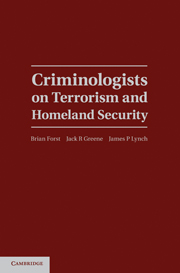Preface
Published online by Cambridge University Press: 04 February 2011
Summary
DESCRIPTION, RATIONALE, AND SCOPE
This is a book of original essays addressing what is widely regarded as the most serious problem confronting America today and for years to come – terrorism – from a unique perspective: that of criminology. The literature on terrorism is framed typically from a geopolitical perspective and using ethnographic narratives, based on case studies that provide essential information about specific terrorist groups, their agendas, how they operate, and how they arise from and influence external political forces. Although scholarly and useful, these conventional approaches to thinking about terrorism overlook a well-developed body of knowledge on the nature and sources of aggression generally and crime in particular, and what can be done to prevent both. The criminological perspective thus provides a potentially useful complement to the standard literature on terrorism. Criminology has amassed a rich body of literature ranging from individual motivations toward crime and antisocial behavior, small-group dynamics in cultivating and reinforcing deviant subgroups, organized and networked crime syndicates and their use of technology to create and exploit criminal opportunities, and more broadly defined cultural orientations toward the social order. Criminology has also studied policies and programs to prevent and respond to crime, as well as ones aimed at mitigating the consequences of criminal behavior. This book explores the prospect of putting this alternative perspective to service to help understand terrorism and develop policies to prevent or mitigate its effects.
- Type
- Chapter
- Information
- Criminologists on Terrorism and Homeland Security , pp. xix - xxiiPublisher: Cambridge University PressPrint publication year: 2011

